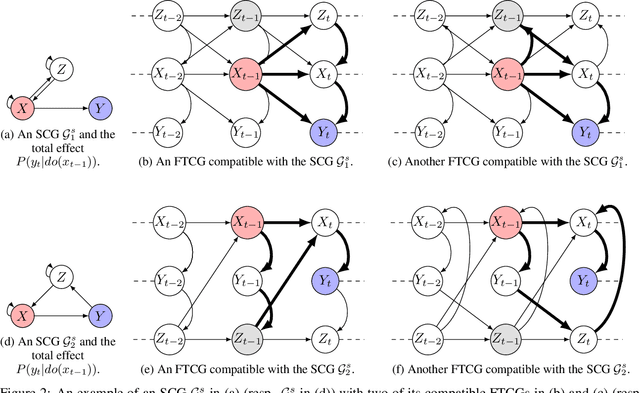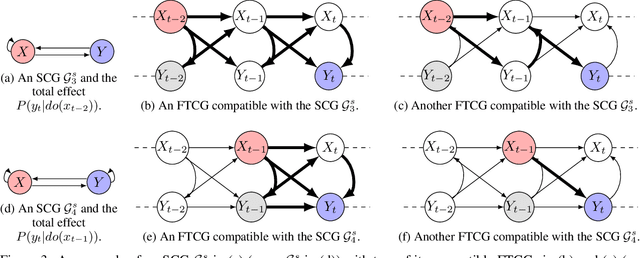Gregor Gössler
LIG, SPADES
Identifiability of total effects from abstractions of time series causal graphs
Nov 02, 2023



Abstract:We study the problem of identifiability of the total effect of an intervention from observational time series only given an abstraction of the causal graph of the system. Specifically, we consider two types of abstractions: the extended summary causal graph which conflates all lagged causal relations but distinguishes between lagged and instantaneous relations; and the summary causal graph which does not give any indication about the lag between causal relations. We show that the total effect is always identifiable in extended summary causal graphs and we provide necessary and sufficient graphical conditions for identifiability in summary causal graphs. Furthermore, we provide adjustment sets allowing to estimate the total effect whenever it is identifiable.
Counterfactual Causality from First Principles?
Oct 10, 2017Abstract:In this position paper we discuss three main shortcomings of existing approaches to counterfactual causality from the computer science perspective, and sketch lines of work to try and overcome these issues: (1) causality definitions should be driven by a set of precisely specified requirements rather than specific examples; (2) causality frameworks should support system dynamics; (3) causality analysis should have a well-understood behavior in presence of abstraction.
* In Proceedings CREST 2017, arXiv:1710.02770
Proceedings First Workshop on Causal Reasoning for Embedded and safety-critical Systems Technologies
Aug 26, 2016Abstract:Formal approaches for automated causality analysis, fault localization, explanation of events, accountability and blaming have been proposed independently by several communities --- in particular, AI, concurrency, model-based diagnosis, formal methods. Work on these topics has significantly gained speed during the last years. The goals of CREST are to bring together and foster exchange between researchers from the different communities, and to present and discuss recent advances and new ideas in the field. The workshop program consisted of a set of invited and contributed presentations that illustrate different techniques for, and applications of, causality analysis and fault localization. The program was anchored by two keynote talks. The keynote by Hana Chockler (King's College) provided a broad perspective on the application of causal reasoning based on Halpern and Pearl's definitions of actual causality to a variety of application domains ranging from formal verification to legal reasoning. The keynote by Chao Wang (Virginia Tech) concentrated on constraint-based analysis techniques for debugging and verifying concurrent programs. Workshop papers deal with compositional causality analysis and a wide spectrum of application for causal reasoning, such as debugging of probabilistic models, accountability and responsibility, hazard analysis in practice based on Lewis' counterfactuals, and fault localization and repair.
 Add to Chrome
Add to Chrome Add to Firefox
Add to Firefox Add to Edge
Add to Edge